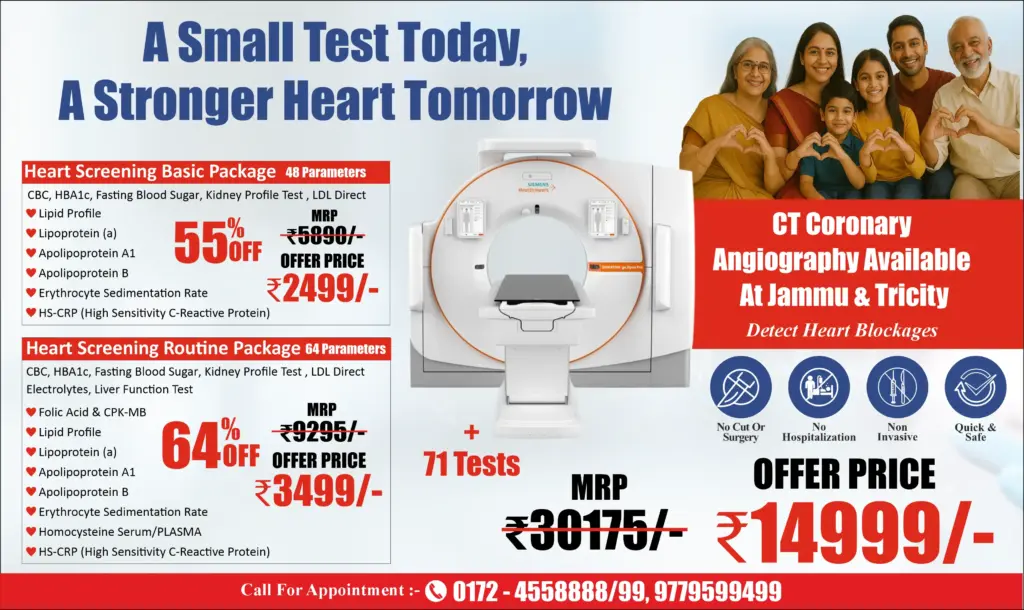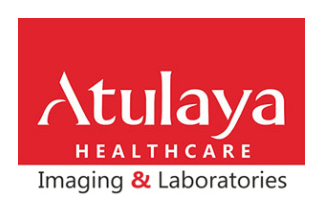
Each heartbeat keeps you alive. On this World Heart Day, we are reminded that maintaining heart health is crucial. Heart diseases are still the leading causes of death globally, but most heart ailments can be prevented or managed if diagnosed at an early stage regularly and with the right positive lifestyle.
Why Prioritize Heart Health?
The heart sends blood, oxygen, and nutrients to all parts of the body. Factors like poor diet, physical inactivity, smoking, stress, and family history can damage the heart and blood vessels over time and can cause harm. Most cardiovascular conditions develop without an obvious pattern and show symptoms only when a lot of damage has been done.
That’s why heart health needs to be monitored regularly, both through lifestyle changes and with special diagnostic tests that detect risks in advance and guide interventions directed at them.
Tests for Heart Health and Why They Are Needed
The following are among the most valuable tests that play a significant role in determining and assessing heart health:
Lipid Profile
This test will quantify total cholesterol, LDL (“bad” cholesterol), HDL (“good” cholesterol), and triglycerides. Elevated LDL and triglycerides may lead to the accumulation of plaque (calcium) in arteries, increasing the risk of blockage, heart attack, and stroke.
High-Sensitivity C-Reactive Protein (hs-CRP)
CRP is an inflammatory liver protein that is secreted during inflammation. Even minor inflammation in blood vessels can lead to the onset of cardiovascular diseases. The hs-CRP test is more sensitive to cardiac disease compared to the standard CRP test and detects early inflammation due to atherosclerosis and is an excellent marker for assessing the risk of heart disease.
Homocysteine & Folic Acid
Folic acid, a B vitamin, assists in heart health by metabolizing homocysteine into methionine. Raised levels of homocysteine, hyperhomocysteinemia, are linked with a greater risk of cardiovascular disease. Although folic acid is efficient in reducing homocysteine levels, its clear-cut clinical value in minimizing cardiovascular events such as heart attacks has not been seen in most studies. Yet, it is promising in lowering the risk of stroke and enhancing endothelial function.
Apolipoprotein A & B (Apo A & Apo B)
ApoB is a component of LDL particles and is the direct candidate for a bad cholesterol marker, while ApoA is linked to HDL. Their ratio is more informative regarding cardiovascular risk than the application of the conventional cholesterol tests alone.
Lipoprotein(a) LPa
A risk factor for genetics, elevated Lp(a) levels are associated with early heart disease and stroke. Testing for Lp(a) is recommended in patients with early heart disease or a family history of heart disease.
CPK-MB (Creatine Phosphokinase – MB Fraction)
This is a test for heart muscle injury, often used in emergencies to determine or rule out a heart attack.
Calcium Scoring (CT Coronary Calcium Scan)
Calcium deposits in the coronary arteries are one of the earliest indications of atherosclerosis, or hardening of the arteries. A calcium scoring test uses CT scanning to detect and quantify the deposits, which can forecast the possibility of a future heart attack—even in symptom-free patients. It’s an entirely noninvasive, fast scan.
CT Coronary Angiography (CT Angio)
CT Angio gives a detailed examination of the blood vessels, with blockages or constrictions that may restrict the flow of blood. It is especially useful in the evaluation of chest pain, shortness of breath without cause, or other heart symptoms. With the aid of this test, which is not invasive, doctors can determine treatment.
How These Tests Work Together
These tests present an overall picture of the condition of heart health. For example:
hs-CRP helps uncover hidden inflammation that could result in plaque formation.
Homocysteine is high and damages the arteries, but folic acid supplementation metabolizes it and reduces the risk.
Calcium scoring may reveal early calcification of the arteries, whereas CT Angio confirms if these plaques are really obstructing blood flow.
When combined with lifestyle modifications—such as diet, physical activity, smoking history, and stress levels—these tests allow medical professionals to develop individualized heart care plans.
Simple Steps that can help prevent heart risks
• Eat a heart-healthy diet with abundant fruits, vegetables, and whole grains.
• Do regular exercise to keep the body active and strong.
• Don’t smoke and limit alcohol intake.
• Quit stress with relaxation techniques like yoga or meditation.
Go for regular tests to check for heart health, especially if you have risk factors like obesity, diabetes, hypertension, or family history.
This World Heart Day be smart act for your heart.
Your heart must be loved and pampered every day, not just on special occasions. With a clear picture of heart health in hand by regular check-ups, adopting healthier lifestyle options, and taking advantage of hi-tech diagnostic investigations at Atulaya Healthcare, you can safeguard your heart’s health in the years ahead.
Book your heart check-up today and reward your heart with the care it deserves!

